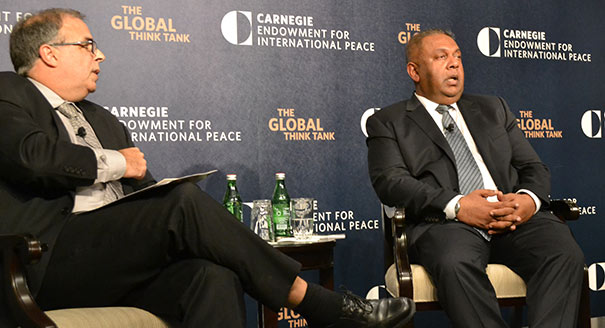Registration
You will receive an email confirming your registration.
The election of Maithripala Sirisena as president of Sri Lanka in January 2015 brings the promise of a new era for the nation. His election holds significant implications not only for the promotion of democracy and human rights in Sri Lanka, but also for reconciliation with the Tamil minority. President Sirisena has also promised to redefine Sri Lankan foreign policy, taking a more balanced approach that should aid in getting relations with Western powers back on track.
Mangala Samaraweera, newly appointed foreign minister of Sri Lanka, presented the priorities of the new government and discuss the challenges ahead as parliamentary elections approach. Carnegie President William J. Burns introduced the foreign minister, and Carnegie’s Frederic Grare moderated.
Mangala Samaraweera
Mangala Samaraweera was appointed as Sri Lanka’s minister of foreign affairs in January 2015. Since entering the Sri Lankan political arena in 1988, he has served most prominently as the joint spokesperson for Maithripala Sirisena during his election campaign, member of Parliament for the Matara district, member of the leadership council of the United National Party, and foreign minister under the government of President Mahinda Rajapaksa from 2005-2007.
William J. Burns
William J. Burns is president of the Carnegie Endowment for International Peace, the oldest international affairs think tank in the United States. Ambassador Burns retired from the U.S. Foreign Service in 2014 after a thirty-three-year diplomatic career. He holds the highest rank in the foreign service, career ambassador, and is only the second serving career diplomat in history to become deputy secretary of state.
Frederic Grare
Frederic Grare is senior associate and director of Carnegie’s South Asia Program. He works on India’s Look East policy, on Afghanistan and Pakistan’s regional policies, and on the tension between stability and democratization, including civil-military relations, in Pakistan.
